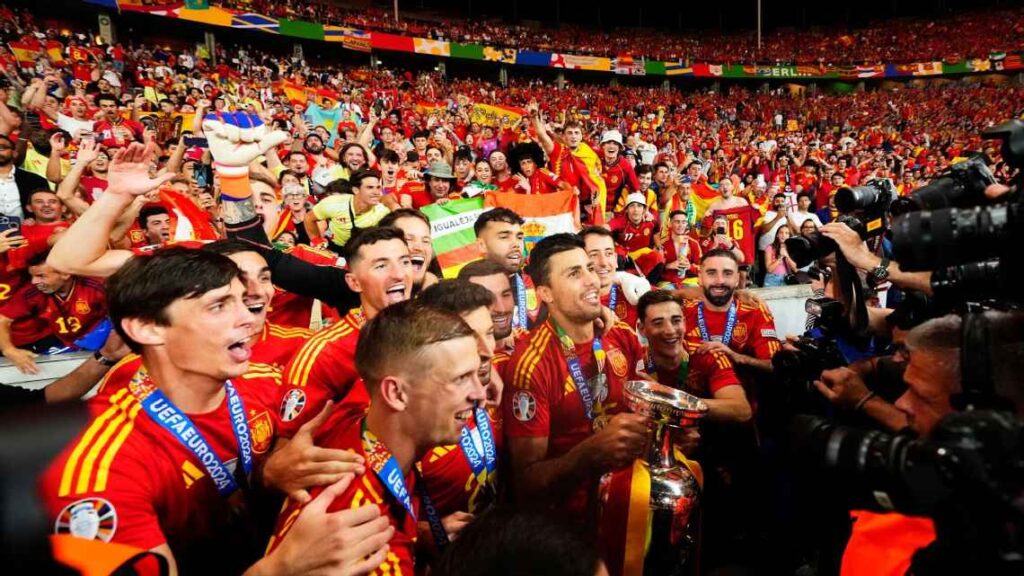
In 2012, Spain’s European Championship victory was defined by the brilliance of legends such as Xavi, Andres Iniesta, Sergio Ramos, Gerard Piqué, Iker Casillas, Sergio Busquets, Xabi Alonso, and Jordi Alba. These stalwarts of Real Madrid and Barcelona, united by the leadership of Xavi and Casillas, set aside their historic club rivalries to dominate international football, winning Euro 2008, the 2010 World Cup, and Euro 2012 consecutively, a feat never before accomplished.
Fast forward to 2024, and Spain’s latest European Championship win presents a different narrative. While this team may not feature as many household names, it still boasts its share of rising stars and world-class talent. Lamine Yamal, who finished the tournament with four assists, has already made a name for himself. Rodri, recognized as the best in his position, was crucial until he was substituted at half-time for Martín Zubimendi, yet Spain continued their seamless performance.
Nico Williams, who scored the opening goal and was named player of the match, shows promise of reaching stardom, as does Dani Olmo, provided he can stay fit. Veteran Dani Carvajal, still exceptional in his 30s, adds to the team’s strength. However, comparing this squad to the 2012 lineup in a “Combined XI” game would likely not be favorable for the current team.
Spain’s victory in Euro 2024 represents more than just individual talent; it’s a triumph of a playing philosophy and a cohesive system. Echoing Johan Cruyff’s philosophy of having no plan B but rather executing plan A better, Spain’s approach saw them win all seven games in the tournament, six within regular time – a record in Euros history matched only by Brazil in the 2002 World Cup and the U.S. women’s team in the 2019 World Cup.
In the final held in Berlin, Spain adhered to their 4-3-3 formation, which morphed into a 4-2-3-1 when in possession. Their game plan, centered on possession and pressing, utilized the talents of young wingers Yamal and Williams effectively. This tactical identity was crafted by Luis de la Fuente, a long-time Spanish Football Association figure who spent over a decade working with various age groups within the system. His deep connection with players like Fabián Ruiz, Dani Olmo, Mikel Oyarzabal, Mikel Merino, and Unai Simón, who have all played under his guidance at different levels, was instrumental in Spain’s success.
De la Fuente’s influence was evident throughout the tournament. The core of this victorious team had grown under his mentorship, showcasing their maturity and resilience at critical moments. Whether it was overcoming Italy in the group stage, enduring extra time against Germany, or coming from behind to defeat France in the semifinals, Spain displayed unwavering confidence and determination.
England, managed by Gareth Southgate, posed a significant challenge in the final. They managed to slow the game to a crawl in the first half, creating a congested and physical midfield battle. Despite this, Spain remained steadfast in their strategy. Even after Rodri’s substitution, they maintained their belief in their game plan. Yamal’s incisive play and Olmo’s positioning led to Spain’s opening goal, with both players creating numerous opportunities.
England’s equalizer, spurred by substitutions that brought fresh energy, briefly shifted the momentum. However, Spain’s persistence paid off when Mikel Oyarzabal, replacing Alvaro Morata, scored the winning goal. The dramatic finale saw crucial saves from Simón and defensive heroics from Olmo, cementing Spain’s victory.
This triumph is a testament to the players’ skill and the systematic development fostered by the Spanish Football Association. De la Fuente’s meticulous planning and intimate knowledge of his squad proved that sometimes, the right leader is not a high-profile figure but someone who understands and believes in his team’s potential.
Spain’s dominant performance throughout Euro 2024, culminating in their record fourth European Championship, underscores the importance of a well-executed strategy and a unified team vision. This victory is not just about adding another trophy to the cabinet but a celebration of a philosophy that prioritizes collective effort over individual brilliance.
